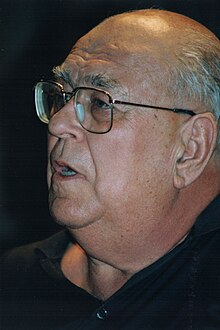Danilo Dolci | |
|---|---|
 Danilo Dolci in 1992 | |
| Born | 28 June 1924 |
| Died | 30 December 1997 (aged 73) |
| Nationality | Italian |
| Other names | "Gandhi of Sicily" |
| Occupation(s) | Social activist, sociologist, popular educator and poet |
| Known for | Prominent antimafia activist and protagonist of the non-violence movement in Italy |
Danilo Dolci (28 June 1924 – 30 December 1997) was an Italian social activist, sociologist, popular educator and poet. He is best known for his opposition to poverty, social exclusion and the Mafia in Sicily, and is considered to be one of the protagonists of the non-violence movement in Italy. He became known as the "Gandhi of Sicily".[1]
In the 1950s and 1960s, Dolci published a series of books (notably, in their English translations, To Feed the Hungry, 1955, and Waste, 1960) that stunned the outside world with their emotional force and the detail with which he depicted the desperate conditions of the Sicilian countryside and the power of the Mafia. Dolci became a kind of cult hero in the United States and Northern Europe; he was idolised, in particular by idealistic youngsters, and support committees were formed to raise funds for his projects.[2]
In 1958 he was awarded the Lenin Peace Prize, despite being an explicit non-communist.[1] He was twice nominated for the Nobel Peace Prize by the American Friends Service Committee (AFSC), which in 1947 received the Nobel Peace Prize along with the British Friends Service Council, now called Quaker Peace and Social Witness, on behalf of all Quakers worldwide.[3] Among those who publicly voiced support for his efforts were Carlo Levi, Erich Fromm, Bertrand Russell, Jean Piaget, Aldous Huxley, Jean-Paul Sartre and Ernst Bloch. In Sicily, Leonardo Sciascia advocated many of his ideas. In the United States his proto-Christian idealism was absurdly confused with communism. He was also a recipient of the 1989 Jamnalal Bajaj International Award of the Jamnalal Bajaj Foundation of India.[4]
Salvatore Farina, who met him personally, described Dolci «an exemplary human being who exuded charisma from every pore».[5]
- ^ a b "Danilo Dolci, the Gandhi of Sicily, died on December 30th, aged 73", The Economist, January 8, 1998
- ^ "Danilo Dolci", by Frank Walker, in Danilo Dolci nell'accademia del villaggio globale (a cura di Gaetano G. Perlongo), March 1998
- ^ "Nobel Peace Prize nominations". American Friends Service Committee. Archived from the original on 2008-08-15. Retrieved 2007-01-12.
- ^ "Jamnalal Bajaj Award". Jamnalal Bajaj Foundation. 2015. Retrieved October 13, 2015.[permanent dead link]
- ^ Salvatore Farina, Remembering Danilo Dolci, in "Sicilia libertaria", n. 449, june 2024, p. 5.